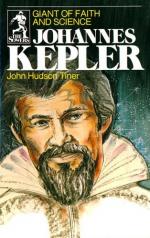|
This section contains 794 words (approx. 3 pages at 300 words per page) |

|
KEPLER, JOHANNES (1571–1630), was the discoverer of the laws of planetary motion named after him. He was born at Württemberg, Germany. Owing to his family's poverty, the young Kepler had to leave school to work in the fields, but his physique was too frail for such labor. In 1584, therefore, he decided to train for the priesthood. His brilliant academic record earned him acceptance at the University of Tübingen, where he was introduced to the ideas of Copernicus. In 1594 he was appointed to the professorship of astronomy at Graz. There, in addition to preparing astrological almanacs, he devoted himself to studying the solar system. His publication of Mysterium cosmographicum (1595) attracted the attention of the great Danish astronomer Tycho Brahe, who invited him to Prague and whom he succeeded as imperial astronomer to the emperor Rudolf II, in 1601. Kepler published some optical discoveries in 1604 and, in 1609, found...
|
This section contains 794 words (approx. 3 pages at 300 words per page) |

|


